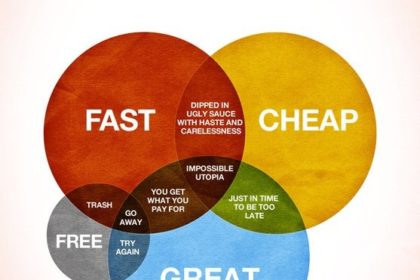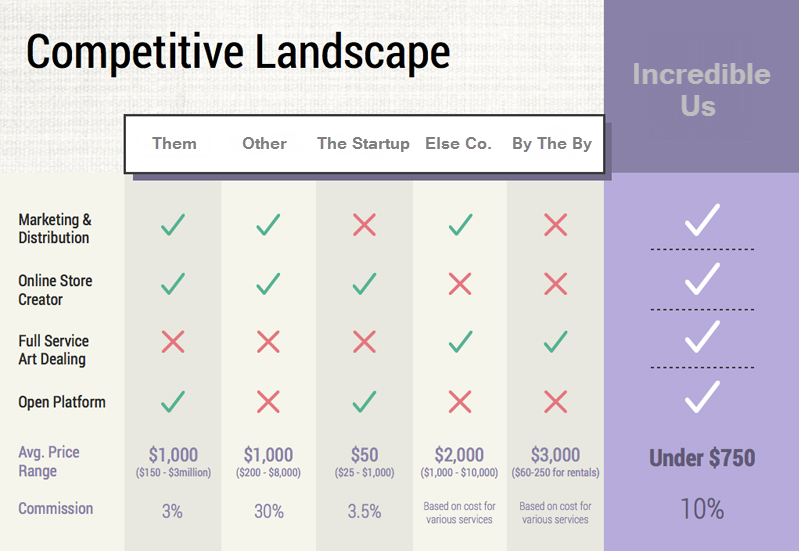
Also known as Cheaper / Better / Faster, you get to pick two.
How do you compete with a startup doing the same thing as you?
You study them.
It’s called Marketing. That’s what Marketing actually is, too many think it means promotion or advertising. see: Is Advertising Marketing? The Best Marketing Advice to Give a Startup Founder
Marketing is the most important and valuable thing a venture does. That’s not *my* opinion, economists for decades have been pointing it out.
Marketing means knowing the market. And since this question brought you here, I’m led to conclude that you aren’t prioritizing that above all else. How you compete is among the most paramount questions in a startup and not having figured that out first is a little foolish (no disrespect 😉 ). You started a business without having done this first?? That’s okay, most do.
They say the definition of insanity is doing the same thing over again and expecting a different result… let’s not keep spending time and money to start a business the insane way.
That’s a slide I see in most pitch decks.
That’s how most founders think.
Founders who show me that slide are insane. Founders who really believe that they can be Cheaper AND Better AND Faster, at everything, than anyone else in the world, are insane.
They keep plodding along doing the same thing, expecting it to finally work, when the market(ing) should be telling them what to do; constantly changing and challenging their assumptions as they pivot to find what works.
“Marketing and Innovation are the only two things that create value in business” – Peter Drucker.
That’s your answer
You do either, or preferably both, of those things better.
To do that, you have to study them.
Be less expensive, or better, or faster, in each of the considerations of your business from how the product works, to the customer support you deliver, to how you promote and advertise.
Accomplishing AND maintaining just ONE of those things is your competitive advantage.
Don’t make the mistake of presuming it’s a race to get your solution to market. That’s a BS, Lean Startup alluded misunderstanding. Your Product/Solution, just as does your idea, doesn’t mean anything if you can’t compete in the market (it’s called marketing for a reason)






Good share Paul O’Brien
Can you explain the “free” space on that graphic? I’m having a hard time figuring out why it would even be included.
Fast, Cheap, or Great, pick two.
What if you want something free? Happens all the time, no? People create free content or deliverables all the time. So there’s really a fourth choice which is “Free” because it’s distinct from “Cheap”….
Meaning, you can get Free AND Great or FREE and Fast … good luck with that… you’re not getting Free and Great and Fast … and if you don’t care, it’s not hard to find just Free – you get what you get.
There’s a lot of “free” or open-source solutions to a lot of consumer problems today. If you’re in one of those markets, it’s necessary to consider that as part of your competitive set. I work in pharma, where the real solution to a lot of health problems is “diet and exercise.” And yet we sell a lot of drugs for conditions that could be solved this way. We still need to consider whether an insurance company would tell us to get stuffed with a new product because it’s no better than diet-and-exercise. This, despite the data showing that patient uptake of diet-and-exercise is right around 10% and not climbing at all, no matter what you tell the patient.
The greatest competitor in innovation is open source.
I meant from the perspective of a startup… seems like you gave an answer from that of a consumer. But maybe I just didn’t understand that either.
I mean it from the perspective of a startup… be fast, cheap, good… or free. You can’t be all of them. At least not for long or without substantial funding.
Thank you for sharing, Paul O’Brien. Most part made sense with some I found hourous. Just one point I don’t get it and would like to seek your clarification. What’s wrong with lean startup?
SpaceX …
What about them? You’re suggesting they’re an example of a company capably doing everything better? *Everything* in space?
Its Not in space but rather too space
Cheaper / Better / Faster
What about telling people to figure out how they’re different from their competition? And their answer may be that they’re cheaper/better/faster. Knowing what to say when people ask, “why should I buy from you instead of another company?”
As a career marketing professional, I totally agree with this answer and with the FASTER-BETTER-CHEAPER-Pick-Any-Two meme. HOWEVER, with the abundance of VC / PE funding in the last few years, the zone of IMPOSSIBLE UTOPIA – Faster + Better + Cheaper – seems to be increasingly becoming possible.
Back in the day, VC funding would subsidize losses only in the early days of a startup. Whereas, in the last 1–2 years, liquidity has gone through the roof and VC / PE funding seems to be subsidizing a startup’s losses right up to IPO and the common man, after IPO.
At one time, I thought this was an exception restricted to a few rockstars like Box, Dropbox, Snap, Spotify, Survey Monkey and Tesla, who enjoyed skyhigh valuations despite making whopping losses even after going public. But I recently learned that more than 80% of IPOs in the US in 2018 were of loss making companies.
So, I’ve started wondering these days if the time has come to discard the good old FASTER-BETTER-CHEAPER meme.
Awesome! Well stated explanation of what Marketing REALLY is supposed to accomplish!
Thank you Ishan! My frustration stems from the perspective that there is nothing new here. The internet enabled everyone’s understanding and expectation of Marketing to get off track; we’re just trying to get it back on so we can move forward in a more valuable direction for all.
Paul O’Brien Great answer but you missed an important factor. In most cases competition is critical to success. It adds market validation and a target for you to chase or lead.
I’ve been at a startup that had at least 1/2 dozen companies doing the exact same thing and probably 2 dozen that had overlapping shades of grey on what we did. As a late entrant to this field the startup struggled and failed.
I’ve also even at a startup with no competition at all. Fantastic technology, super, super high performance storage. But it turned out the market for super high performance storage was very small. We had a succesful exit to get acquired and were shutdown in a year with no large market.
Companies that build something with significant feature differentiators can attack an existing market. Building a company is hard, building a company and defining a brand new market is almost impossible.
Competition is good.
Oh indeed! I didn’t miss it so much as I wanted to drive a point home related to the question, more that wax poetically (as I tend to do) about ancillary things.
Great point. There is something known as the Second Mover Advantage for a reason!
Excellent answer, thank you!
Paul O’Brien Very good points. One dark side and potential wrinkle. Many companies promise all 3 and then almost always only deliver on cheaper, faster. The problem is, by the time the client finds out they’re in trouble due to taking the cheaper offer, the company that offered “better” has already lost the contract, while the company that offered “cheaper/faster” has already taken the money and ran.
Robert Oschler that’s the better part of why so many businesses, startups, and investors are increasingly suspicious of and neglecting Marketing. Too many people pretending to be marketers, too many people selling marketing when it’s really just Adwords or basic Facebook campaigns, too many people screwing up social media, PR, design, etc. Businesses end up taking the cheaper/faster and get disappointed with the results; then concluding that it just doesn’t work.
Recently spoke to a founder about this very question – going to share this piece now. Thanks!
Awesome, glad it might help. Thanks Luke O’Neill!
Perception can be more important than fact; that’s why marketing exists.